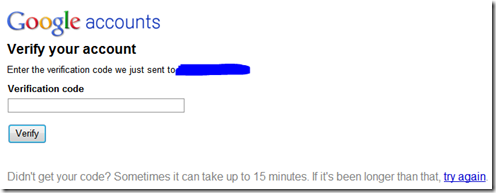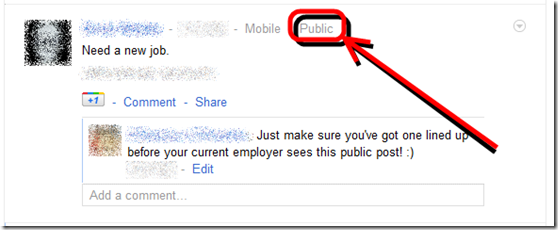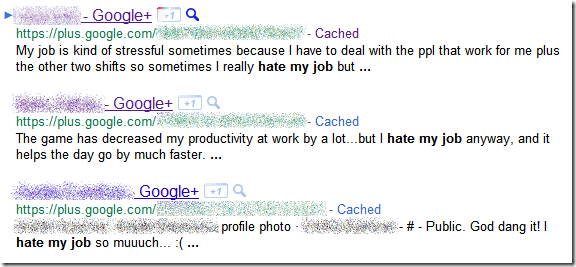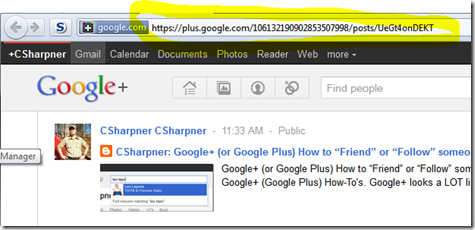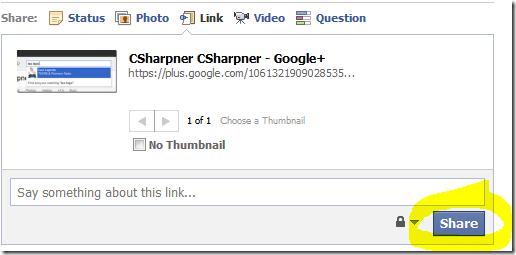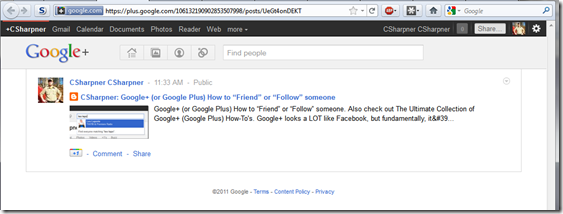The reality is people that can use their “real names” online, without concern, are actually the fringe group. How so? The only way a person could use their “real name” online on a service like Google+ is if they fit ALL of the following criteria:
Click here to follow me on Google+.
- Have no political opinions or zero desire now or at any time in the future to express them AND:
- Currently have an employer with EXACTLY the same political opinions as they do or that would NEVER hold them against you, even privately without you knowing about it by overlooking you for promotions, raises, or bonuses, for example, or even worse, putting you at the top of the list when the next round of layoffs come around.
- All their future employers will always have EXACTLY the same political opinions as they do.
- All future potential employers and everyone who sees their resume once submitted will have exactly the same political opinions they do and none of the people in the chain of people who can “lose” the resume are upright citizens who’d never “accidentally throw away” a resume because of political differences.
- Have family members, who every one of them have no problems with political differences.
- Do not live in a country where political descent is punished.
- Have no spouse or “significant other”, or have one that has no problems with differences in political opinion.
- Are never asked their political opinion by people who would berate them online for not agreeing with them.
- Have no religious opinions or zero desire now or at any time in the future to express them AND:
- Currently have an employer with EXACTLY the same religious opinions as they do.
- All their future employers will always have EXACTLY the same religious opinions as they do.
- All future potential employers and everyone who sees their resume once submitted will have exactly the same religious opinions they do and none of the people in the chain of people who can “lose” the resume are upright citizens who’d never “accidentally throw away” a resume because of religious differences.
- Have family members, who every one of them have no problems with religious differences.
- Do not live in a country where religious descent is punished.
- Have no spouse or “significant other”, or have one that has no problems with differences in religious opinion.
- Are never asked their religious opinion by people who would berate them online for not agreeing with them.
- Have never been the victim of a humiliating crime (rape?) or have been but seeks no need to discuss it online, pseudonamously.
- Have no interests whatsoever that don’t fit social norms (fetishes, etc…) or have them but have no need to discuss them pseduonamously.
- Don’t have kids or have them, but would never, ever make the mistake of posting a photo online, under their real name, with unknowingly having GPS coordinates embedded (many modern cameras and most smartphones do this, BTW), effectively broadcasting YOUR NAME, your kids images, and your kids home address, to any stranger (predator pedophile) on the net!
- Have absolutely no way for people to find your home address from your real name. Knowing your real name and your city, it’s very easy to find your home address, so any stranger can show up on your front door for any psycho reason they have. Perhaps they vehemently disagree with something you said and are there to “set you straight”, or to just simply kill you.
- You never, ever announce online that you’re away from home (at work, out to eat, on vacation), unintentionally informing strangers that your home and all your expensive stuff inside it (or, more importantly, your wife and/or kids) is unguarded.
- Always agree with every single one of your company’s policies OR disagree but have no desire to ever (while you’re employed) say anything about it online, even if you can say it with a pseudonym, EVER while you’re employed.
- Are happy with your boss and supervisor(s) 100% of the time OR are unhappy with them occasionally, but would never say anything online, even with the protection of a pseudonym.
- Have never done anything embarrassing in your past or have but have never discussed it online.
- Are not a celebrity (major or minor) or ARE one but never want to comment online, not even with a fake name.
- Feel perfectly comfortable with every single online post you’ve EVER made and EVER WILL make being shown to:
- Your enemies
- Your competitors
- Your parents
- Your kids
- Your sisters
- Your brothers
- Your Aunts
- Your Uncles
- Your Grandparents
- Your nieces
- Your nephews
- Your spouse
- Your ex-spouse
- Your ex-spouse’s lawyer
- Your ex-spouse’s private investigator
- Your neighbors
- Your friends
- Your friends spouses
- Your friends kids
- Your girlfriend/boyfriend
- Your ex girlfriends/boyfriends
- Your descendants in the centuries to come.
- Every police officer that will ever pull you over in the future (they can do a Google search from their squad car while you’re pulled over!)
- Every judge you ever have to stand in front of.
- Every jury member that will ever decide your fate.
- Every HR rep at every company you’ll ever work for.
- Every boss you’ll ever work for.
- Every supervisor you’ll ever work for.
- Every coworker you’ll ever work with.
- Every employee you’ll ever have.
- Every banker that has access to your money.
- Every clergy member at your religious institution now and in the future.
- Every parishioner at your religious institution now and in the future.
- Every member of every volunteer organization you’ll ever volunteer for.
- Every review board for:
- Prizes
- Scholarships
- Venture capital for your new business
- Patent board
- DMV workers
- Clerks at any organization where you have to go through red tape to get something accomplished.
- Your teachers
- Your professors
- Your principals
- Your Mother-in-law
- Your Father-in-law
- Your brother in law(s)
- Your sister in law(s)
- Everyone you owe money to
- People that have done you harm in the past (pedophiles, rapists, bullies, bad cops, bad judges, nosy neighbors, gang members, etc…)
These are just examples of completely innocent people! that have needs for pseudonyms.
So, are you excluded from ALL of those categories? NO? Then YOU need a pseudonym to be able to express your opinions online without retribution in your offline world.
It’s now common practice for employers to do a Facebook, MySpace, and Google+ search on potential candidates. You should expect that all your posts will be read by those hiring you in the future.
The reality is, you’d be hard pressed to find anyone that has no need for a pseudonym. Unfortunately, just as people don’t think much about avoiding web sites with malware, don’t think about protecting their PCs from attacks, and just assume they’re safe and that external attacks are fringe cases and they’ll never be infected, so true are people’s attitudes towards online danger that can come back to bite them.
The truth is, if you’ve ever posted anything online under your “real name”, then chances are very high that you’ve posted something that has the potential to cause you harm in the future. You may not have even been aware of it at the time you posted it, nor even been aware of it since. You may have already suffered damage and still aren’t aware of it. Here are some examples of things that may have already happened to you (or your loved ones) because of something you posted online, but you’re still blissfully unaware of the reason:
- Bypassed for a promotion.
- Gotten placed at the front of the layoff queue at your company.
- Not received invitation to parties by friends and/or coworkers.
- Not been recommended for anything where you would have been if you had not said whatever it was you said online.
- If your home or car have been burglarized, how do you know it wasn’t because they knew you were gone because you posted it online?
- Been videoed or photographed by a voyeur while changing clothes, or an up-skirt or down-blouse and posted online to pornographic web sites? And even potentially with your real name attached? The voyeur stalked you because they were attracted to your profile photo, and given your real name and your town you published either on your profile or in your posts, they secretly found you in the real world and did this.
- Had your kids passed over for opportunities because the one making the decision doesn’t like something you posted online?
- Identity theft, which can put you and your family in a world of hurt.
The truth is, unless someone tells you that these things happened to you because of what you said online, you’ll never know. You’ll live in blissful ignorance. But, being blissfully ignorant of why these things happen to you or your loved ones DOES NOT PREVENT them from happening to you! In reality, you should NEVER publish your real name online. Publishing your real name online should always be the exception and never the default.
If you already have an account with your real name, you should practice extreme scrutiny with anything you post from that account, unless you can guarantee that every single person in your future who will make a decision that affects your or your loved ones future will NEVER hold ANYTHING you’ve ever posted online against you. I have accounts on social networks with my real name, but I’ve tightened up the security and I’m very careful with who gets to see which of my posts and which posts I even post. So, my accounts with my real name, tend to be quite dull, because I know I can’t express my political opinions, my religious opinions, my opinions about my work (if they’re anything other than positive). I don’t have the freedom of speech, and neither do you, to attach those opinions to our real names. To express those opinions online, we have to do them with a pseudonym, otherwise we risk all sorts of damage in our offline lives and we damage not just ourselves, but those we care about.
So, for your safety and for the safety of those around you, you should be exceptionally protective of your real name. Publishing your real name makes it extraordinarily easy for a complete stranger to find you in the real world and exposes you to all sorts of retaliation.
So, WHO needs a pseudonym? EVERYONE!
BTW, if you want an invite to Google Plus, e-mail me at ![]() . That’s not a clickable e-mail address… It’s a picture to prevent spammers from easily scraping it. You’ll need to type that address, exactly as you see it, including the G and the + in front of the word “Invite”.
. That’s not a clickable e-mail address… It’s a picture to prevent spammers from easily scraping it. You’ll need to type that address, exactly as you see it, including the G and the + in front of the word “Invite”.
See this image? 
You’ll find an actual working version of it at the bottom of this article. Please click the appropriate buttons in it to let your friends.
Check back later for updates too!
Click here to follow me on Google+.
Good Luck and Enjoy your new Google+ account!





